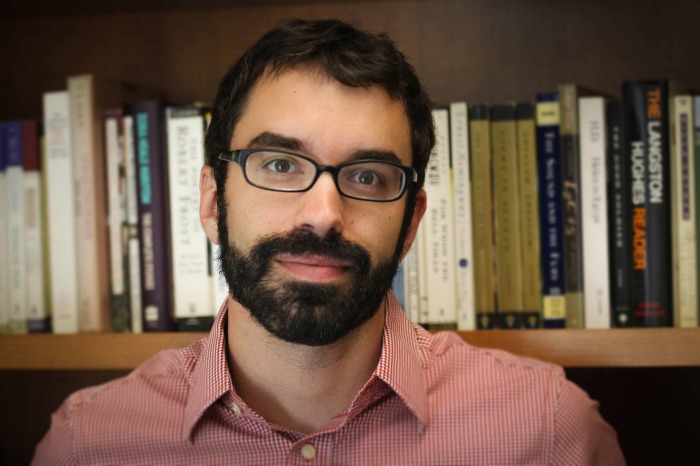
The English department’s latest addition hopes to instill a love of American literature in his students, while completing a project of his own.
“Everyone here has gone out of their way to make me feel welcome,” says Thomas Koenigs, who recently joined Scripps as an assistant professor in the College’s English Department. Aside from a change in weather, he says the transition from the East Coast has been smooth overall, and support from administrators, fellow faculty members, and students alike have helped make it so.
Koenigs, who specializes in 19th-century American literature, is excited to begin his career at a college like Scripps because seminar classroom settings are particularly conducive to teaching literature, he says. Reading a text together, rather than lecturing to the students, makes a better experience for both the professor and the class. “If I were to be lecturing on a book I’ve read 10 times before, I wouldn’t learn anything new about it,” says Koenigs. “But leading a seminar on it, a student almost invariably draws my attention to some interesting detail I’ve always managed to overlook.”
And the conversations and dialogues in his classes are what Koenigs most looks forward to as a professor at Scripps. “I am surprised by the level of intellectual curiosity and engagement in my classes,” Koenigs continues. “Well, that isn’t true. I had a good sense of Scripps’ reputation before I came here, but the students have exceeded my already-high expectations.”
Women’s colleges are also particularly appropriate for his course matter, adds Koenigs, because of the important role fiction has played in female education over the centuries Fiction’s significance in female education is, and has been, a key part of many debates around the genre, making Scripps an exceptional setting for its study, both in the past as well as the present. “I hope I can give students some insight into how the debates about reading and female education from the 19th century still shape how we think about these issues today.”
As if starting a new chapter in his career as a professor wasn’t enough, Koenigs is currently working on a book project titled “Founded in Fiction”: Fictionality in the United States, 1789-1861. Koenigs says he’s excited to have conversations with both students and colleagues on the myriad of materials and ideas for his project as it develops.
“Writing a book is solitary work in a lot of ways, so I always find it energizing and reinvigorating to talk through ideas with students or other faculty,” he says. “It helps remind me why I wanted to write this book in the first place.”
Looking ahead, Koenigs would like to teach courses in American modernism, American women writers, and “Nature and the Individual in American Literature” (Thoreau, anyone?). With each class, he hopes to foster an environment where students can truly guide the conversation and learn from each other as much as they do from the professor, and to challenge their assumptions about what literature is and does.
“We all have a commonsense idea of what counts as literature,” says Koenigs. “But when we study other historical periods, we are confronted with just how limited our own conception of literature’s value and purpose really is.” At the end of each class, “I want students to leave with an expanded sense of literature’s possibilities.”
Professor Koenigs earned his master’s and PhD from Yale University and his bachelor’s from Johns Hopkins University.

